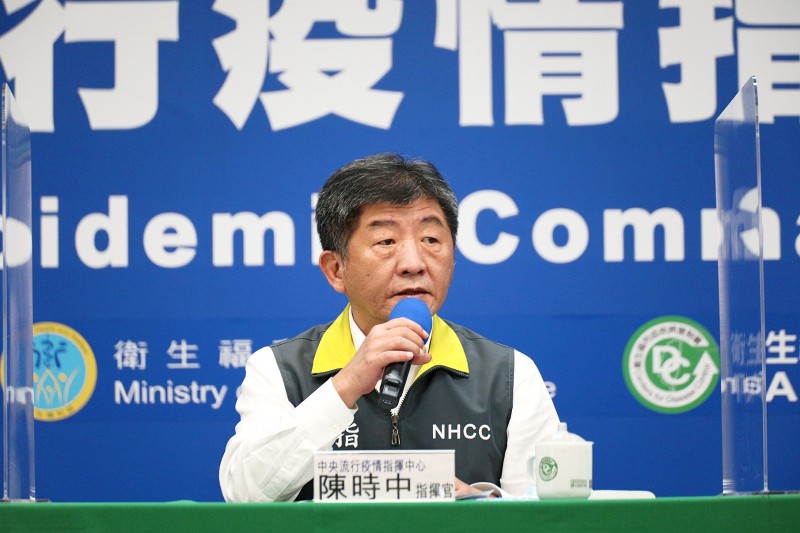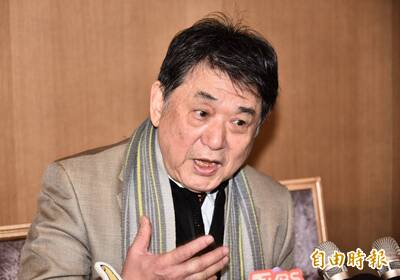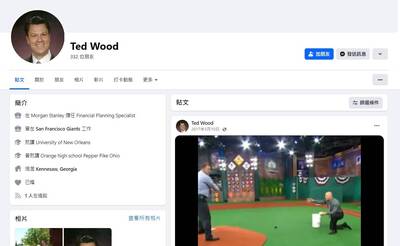《TAIPEI TIMES》 Mask export ban may be lifted next week, official says

Minister of Health and Welfare Chen Shih-chung speaks during the Central Epidemic Command Center’s daily COVID-19 news conference in Taipei yesterday. Photo: CNA
EXCESS: The CECC needs to determine the number of masks it needs to requisition before making a decision this week on allowing manufacturers to export the surplus
By Lee I-chia / Staff reporter
Taiwan is planning to lift a ban on surgical mask exports on Monday next week, Deputy Minister of Health and Welfare Hsueh Jui-yuan (薛瑞元) said yesterday, as the Central Epidemic Command Center (CECC) reported no new cases of COVID-19 infection.
Once the CECC has confirmed the volume of masks it needs to requisition, it would finalize the plan to allow mask exports, likely later in the week, said Hsueh, who heads the center’s medical response division.
Taiwan instituted a mask rationing system in February, at the onset of the COVID-19 outbreak.
As the supply of masks is now sufficient to meet basic consumer demand, the government would allow manufacturers to sell surplus masks to buyers at home or overseas, Hsueh said.
However, the rationing system that limits each adult to nine masks every two weeks would remain in place, the CECC said.
No new cases were confirmed yesterday, said Minister of Health and Welfare Chen Shih-chung (陳時中), who heads the center, adding that a total of 415 infected patients have been released from isolation, while only 19 people remain hospitalized.
As there have been no domestic cases for 43 straight days and no new cases for four consecutive days, the number of people placed under home isolation for coming into close contact with a confirmed case dropped to zero yesterday, he said.
A total of 9,308 people had been put under home isolation since the nation’s first case was confirmed in January, 115 of whom later tested positive for COVID-19, he said.
“There are still 9,551 people under home quarantine,” Chen said, adding that a total of 138,254 people have been placed under quarantine since the outbreak began.
The number of quarantined people peaked in late March, when more than 55,000 people were under quarantine at the same time, but that number has stabilized at about 10,000 people recently, he said.
A total of 2,390 people are still under self-health management, while 50,341 people had been asked to perform self-health management since January, Chen said.
CECC specialist advisory panel convener Chang Shan-chwen (張上淳) said that being placed in a negative-pressure isolation ward might cause stress to some patients, so social workers and counselors have been visiting the wards to talk to patients.
As Taiwan is relatively safe from COVID-19 infection, restrictions on visiting psychiatric wards have been relaxed, Chen said.
Visitors should make a reservation in advance and register their names and personal data; have their body temperature taken when entering the hospital; disinfect their hands; and cooperate with travel, occupation, contact, cluster assessment and other infection control measures.
Each patient is allowed only one visit per day and only one group of visitors — up to two people — would be allowed in the visiting area at the same time, while all visitors and patients must wear masks during visits.
Disease prevention measures for businesses can be gradually relaxed if they can ensure that people keep a distance of 1.5m indoors and 1m outdoors or wear masks, or if they can place dividers between people, the CECC said.
The safest way would be to implement all three measures at the same time alongside a real-name registration system, it said, adding that businesses should try to meet at least one of the three measures and enforce real-name registration, and gradually relax or modify their measures according to their effects and the risks involved.
Additional reporting by CNA
新聞來源:TAIPEI TIMES














